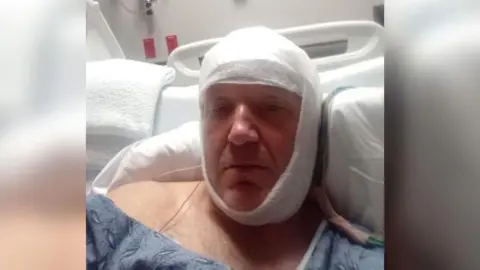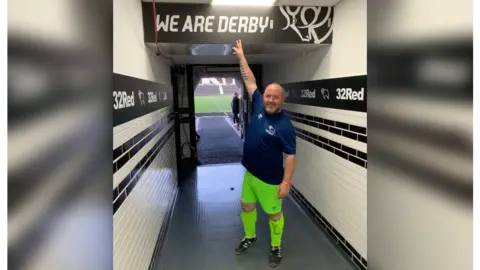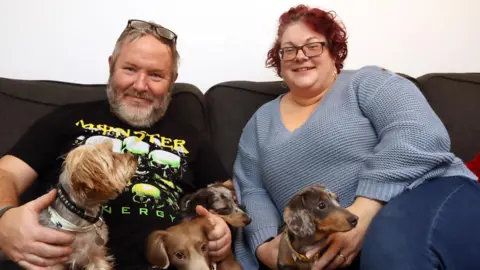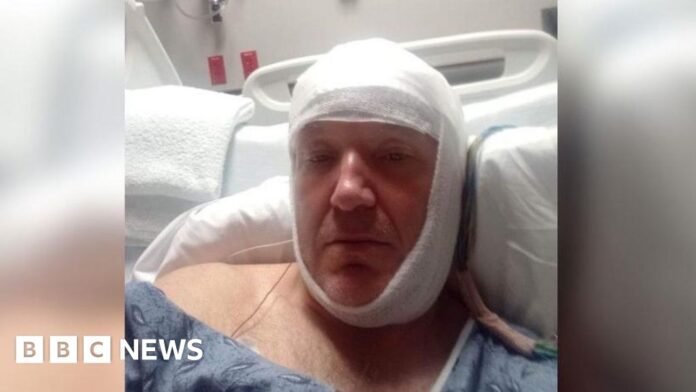Political reporter, BBC Derby
 SUPPLIED
SUPPLIEDRob Bell had been working at a construction site in the US when he fell 25ft from a building three years ago.
The construction engineer from Chaddesden, Derby, was lucky to survive the accident, which left him with seven broken ribs and a fractured skull.
His head injury caused a series of strokes followed by up to 25 seizures a day.
He told the BBC he was left feeling suicidal after initially failing to receive the right help from the NHS – but his situation improved with the help of a specialist team in Derbyshire that the government hopes to replicate nationwide.
The 53-year-old credits the team with helping him to rebuild his life – and he has set his sights on one day regaining the ability to walk.
 SUPPLIED
SUPPLIEDRob’s accident happened in 2022 when a forklift truck driver knocked the pallet of one of the supporting legs from a structure he was working on, causing it to collapse.
His extensive injuries saw him suffer three strokes in the space of five days – one of which made his heart temporarily stop – and he spent three months in hospital in the US followed by a further seven months in hospital back in the UK.
He was later diagnosed with Functional Neurological Disorder (FND) which gives him life-altering symptoms including paralysis and occasional blindness.
Rob said the medication he received to help control multiple seizures a day severely impacted his memory and ability to recognise his 10 grandchildren, as well as sending him spiralling into depression.
His injuries also saw him having to spend around £500 a week on taxis travelling to use public toilets for over a year, because his own toilet at home was not accessible for his new needs.
As a result of the drain on his finances, he ended up skipping meals and having to rely on foodbanks, further adding to his mental health struggles.
“After I got out the hospital and I was on the medication…they just wanted to give me more medication, and I said, I don’t want more medication,” he said.
“I was basically on the clouds, they were drugging me up that much. That was not the life I wanted.
“I even told my family, if nothing’s done, I’m not going into a new year the way I am, I’m just going to take my own life.”
During this desperate time, he was repeatedly admitted into emergency mental health care.
 SUPPLIED
SUPPLIEDBut things began to change when Rob was eventually referred by his GP to the NHS’s Team Up Complex Care Team in Derbyshire,
The team is a few years old and focuses predominantly on care for people unable to leave their homes.
Rob received help with physio, GP visits, and tailoring his medication with a pharmacist, which reduced his tablets from 70 a day to 30.
The team, which is run by Primary Healthcare Derby Limited on behalf of Derby and Derbyshire NHS Integrated Care Board, also assisted in finding him a suitable new accessible home.
The government’s 10-year plan for the NHS includes plans for “pioneering neighbourhood health teams [which] focus on patients with multiple long-term conditions and more complex issues”.
It has cited the Derbyshire team as an example of what it is trying to achieve and “bringing the best of the NHS to the rest of the NHS”.
While critics have highlighted that care closer to home will not necessarily save the health service money, the Derbyshire ICB says last year this team prevented 900 admissions to the emergency department and 500 non-elective admissions by sending specialists out into the community.
“The complex needs team spent time listening to Rob to understand his difficulties, and then involved a wider multi-disciplinary team to develop a plan to support him”, said Dr Ruth Lenehan, Rob’s GP in the complex care team.
“This plan then enabled him to get the right help to address his many complicated medical and social problems.”
The team is currently working through the detail on how further expansion of the initiative might work.
Since receiving the help, Rob says he can finally focus on “living” again.
“I’m living now, I’m not existing. It’s a massive difference. I’ve been to my daughter’s plays, the simple things”, he said.
And while Rob has been told he is unlikely to walk again, he intends to keep trying.
“They say it’s highly unlikely but I say, well – I’m going to do my best,” he said.
If you have been affected by any of the issues in this story, help is available via BBC Action Line.





